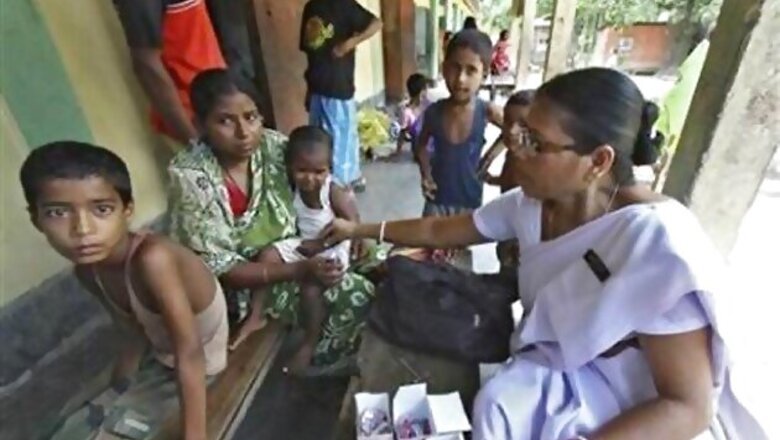
views
Bilasipara: There was little time to do anything but grab her two young boys and run as fast as she could when the gunmen came into the northeast village in the dead of night and began firing.
Along with scores of other villagers, nine-months pregnant Rohima Begum hid with her family waist-deep in the rice fields as the gunshots rang out amid the screams of those left behind.
Eighteen days on, Rohima, like hundreds of thousands in Assam state, languishes in a displacement camp - too scared to go home after the worst ethnic violence in India in a decade.
But the government says the violence, in which 75 people have been killed and more than 400,000 displaced, is over and has set a deadline for fleeing villagers to return to their homes - Independence Day on August 15.
"How can we go back? There is nothing left. We saw them burning down the entire village as we escaped. The fire and smoke were visible from a long distance," Rohima says, cradling her three-day-old boy, who was born in the primary school which now houses 800 people in lower Assam's Dhubri district.
"The people who did this to us live in villages next to us. There is no security. If we go back, they will kill us."
Violence between the Bodo tribespeople and Muslim communities broke out on July 20, after unidentified men killed four Bodo youths. In retaliation, armed Bodos - who dominate Kokrajhar and Chirang districts - attacked Muslims, suspecting them of being behind the deaths.
Communal clashes have since ensued and fleeing survivors speak of large groups of men armed with automatic weapons surrounding entire villages, going on the rampage, gunning down people or hacking them to death with machetes. Hundreds of villages have been looted and razed.
BODIES FOUND EVERY DAY
Convoys of police and paramilitary vehicles patrol the main roads which run through the dusty towns in this fertile area and authorities have imposed a night curfew.
The number of killings has decreased, but there are at least one or two reports of fresh corpses being found every day and the situation remains tense.
"People should start going back to their homes now," says Nilomani Sen Deka, an Assam minister. "We will be providing them with relief and compensation. But they should start going back. Many have gone already. It is safe now."
But both the displaced Bodos and Muslim community say they can no longer live together.
Tensions have long existed between the two groups in this region, famed for its lush tea plantations and as Prime Minister Manmohan Singh's parliamentary constituency.
The Bodos have long fought for a separate homeland and after a 16-year armed struggle, they signed a 2003 peace accord with New Delhi, giving them autonomy over the four districts.
They say many of the Muslims, who over the years have grown to outnumber the Bodos, are illegal immigrants from Bangladesh.
The Muslims, who work for Bodos on their fields and construction sites or as rickshaw drivers, say they are Indian citizens and have voting rights.
This is not the first time that the two groups have clashed. In 1993, Bodos attacked Muslims and other communities resulting in around 2,000 deaths and thousands displaced.
Diseases spread
Almost 300 schools, colleges and community centres have been converted into relief camps. In the suffocating humidity and soaring temperatures, half-naked children lie perspiring on school benches or desks, while women cradle babies who are listless and weak.
Due to poor sanitation and a lack of clean water, disease has spread rapidly and there are tens of thousands of cases of diarrhoea and dysentery.
Twenty-two people have died so far in the camps, while around 8,000 children are sick, according to government figures.
Medical teams visit every few days to distribute medicines and basic food rations of rice and lentils are being given three times a day to the displaced, but aid workers say there is a desperate need for more aid.
"Most of the displaced fled with nothing," says Zubin Zaman from Oxfam India. "Sanitation has to be stepped up with better hygiene practices, access to clean water and more toilets. There is also a need for bedding, clothing, mosquito nets and tarpaulin sheets."
Survivors say they cannot live in such conditions, but add that it is better than dying at the hands of armed mobs.
"We do not want to live like this, but we will not go back. The security forces cannot protect us. They cannot be there 24 hours a day, guarding us," says Barendra Brahma, 70, a retired school teacher in a camp in the town of Kokrajhar.
"I was born in that village. If I go back now, it will only be to die."




















Comments
0 comment